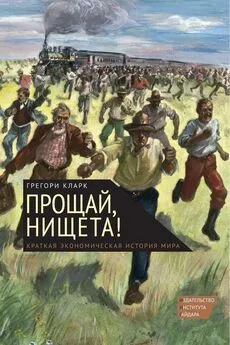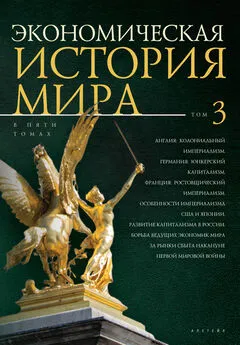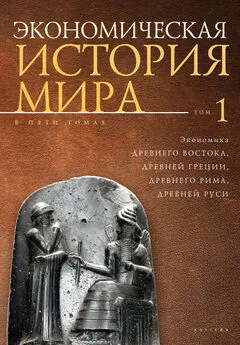Грегори Кларк - Прощай, нищета! Краткая экономическая история мира
- Название:Прощай, нищета! Краткая экономическая история мира
- Автор:
- Жанр:
- Издательство:Издательство Института Гайдара
- Год:2012
- Город:Москва
- ISBN:978-5-93255-338-1
- Рейтинг:
- Избранное:Добавить в избранное
-
Отзывы:
-
Ваша оценка:
Грегори Кларк - Прощай, нищета! Краткая экономическая история мира краткое содержание
Почему одни страны так богаты, а другие так бедны? Почему промышленная революция — и беспрецедентный экономический рост, который начался вместе с ней, — произошла в Англии в конце XVIII века, а не в каком-то другом месте или в какое-то другое время? Почему индустриализация не сделала весь мир богатым — и почему она сделала многие страны еще беднее? В своей книге "Прощай, нищета!" Грегори Кларк рассматривает эти непростые вопросы и предлагает новый взгляд, в соответствии с которым культура, а не эксплуатация, география или ресурсы, объясняет богатство и бедность народов. Эта книга, бросающая блестящий и трезвый вызов идее, что бедные общества могут стать экономически развитыми благодаря внешнему вмешательству, способна изменить наше понимание мировой экономической истории.
Прощай, нищета! Краткая экономическая история мира - читать онлайн бесплатно полную версию (весь текст целиком)
Интервал:
Закладка:
Kirkaldy, Adam W. 1914. British Shipping: Its History, Organization and Importance. London: Kegan Paul, Trench, Trubner.
Knauft, Bruce M. 1987. «Reconsidering Violence in Simple Human Societies: Homicide among the Gebusi of New Guinea». Current Anthropology 28 (4): 457–500.
Koepke, Nikola, and Joerg Baten. 2005. «The Biological Standard of Living in Europe during the Last Two Millennia». European Review of Economic History 9 (1): 61–95.
Komlos, John. 1993. «A Malthusian Episode Revisited: The Height of British and Irish Servants in Colonial America». Economic History Review 46: 768–782.
— 1998. «Shrinking in a Growing Economy? The Mystery of Physical Stature during the Industrial Revolution». Journal of Economic History 58 (3); 779–802.
— 2004. «On British Pygmies and Giants: The Physical Stature of British Youth in the 18th and 19th Centuries». Working Paper, University of Munich.
Krause, Kate, and William T. Harbaugh. 1999. «Economic Experiments That You Can Perform at Home on Your Children». Working Paper, University of New Mexico.
Kremer, Michael. 1993a. «The O-Ring Theory of Development». Quarterly Journal of Economics 108 (3): 551–575.
— 1993b. «Population Growth and Technological Change: One Million В. C. to 1990». Quarterly Journal of Economics 108 (3): 681–716.
Landers, John. 1993. Death and the Metropolis: Studies in the Demographic History of London, 1670–1830. Cambridge, U.K.: Cambridge University Press.
Landes, David. 1998. The Wealth and Poverty of Nations. Why Some Are So Rich and Some So Poor. London: Little, Brown.
Larsen, Clark Spencer. 1995. «Biological Changes in Human Populations with Agriculture». Annual Review of Anthropology 24: 185–213.
Larsen, Jakob А.О. 1938. «Roman Greece». In An Economic Survey of Ancient Rome, Vol. IV, ed. Tenney Frank. Baltimore: Johns Hopkins University Press, pp. 259–498.
Lee, James Z., and Cameron Campbell. 1997. Fate and Fortune in Rural China: Social Organization and Population Behavior in Liaoning, 1774–1873. Cambridge, U.K.: Cambridge University Press.
Lee, James Z., and Wang Feng. 1999. One Quarter of Humanity: Malthusian Mythology and Chinese Realities, 1700–2000. Cambridge, Mass.: Harvard University Press.
Lee, Ronald D., and R.S. Schofield. 1981. «British Population in the Eighteenth Century. In The Economic History of Britain since 1700, Vol. 1: 1700–1860, eds. Roderick Floud and Donald McCloskey. Cambridge, U. K.: Cambridge University Press, pp. 17–35.
Le Roy Ladurie, Emmanuel. 1981. «History That Stands Still». In The Mind and Method of the Historian. Brighton, Sussex:: Harvester Press, pp. 1-27.
Levine, Ruth, and the What Works Working Group with Molly Kinder. 2004. Millions Saved: Proven Success in Global Health. Washington, D. C: Center for Global Development.
Lindert, Peter H. 1986. «Unequal English Wealth since 1670». Journal of Political Economy 94 (6): 1127–1162.
— 2004. Growing Public: Social Spending and Economic Growth since the Eighteenth Century, Vol. 1. Cambridge, U.K.: Cambridge University Press.
Lindert, Peter H., and Jeffrey G. Williamson. 1983. «English Workers' Living Standards during the Industrial Revolution: A New Look». Economic History Review 36 (1): 1-25.
— 1985. «English Workers' Real Wages: Reply to Crafts». Journal of Economic History 45: 145–153.
Lizot, J. 1977. «Population, Resources and Warfare among the Yanomame». Man, New Series 12 (3/4): 497–517.
Long, Pamela. 1991. «Invention, Authorship, 'Intellectual Property, and the Origin of Patents: Notes Towards a Conceptual History. Technology and Culture 32: 846–884.
Lucas, Robert. 1988. «On the Mechanics of Economic Development». Journal of Monetary Economics 22: 3-42.
Lucas, Robert E. 2002. «The Industrial Revolution: Past and Future». In Lectures on Economic Growth. Cambridge, Mass.: Harvard University Press, pp. 109–188.
Macfarlane, Alan. 1978. The Origins of English Individualism: The Family, Property, and Social Transition. Oxford: Blackwell.
— 1987. Marriage and Love in England: Modes of Reproduction 1300–1840. Oxford: Blackwell.
— 2003. The Savage Wars of Peace: England, Japan and the Malthusian Trap. Basingstoke, Hampshire: Palgrave Macmillan.
Interpretations of Human Skeletal Remains in Archaeological Contexts, eds. Helen Bush and Marek Zvelebil. British Archaeological Reports International Series 567. Oxford: Tempus Reparatum.
Mellink, Machteld J., and J. Lawrence Angel. 1970. «Excavations at Karatas-Semay U.K. and Elmali, Lycia, 1969». American Journal of Archaeology 74 (3): 245–259.
Minge-Klevana, Wanda. 1980. «Does Labor Time Increase with Industrialization? A Survey of Time-Allocation Studies». Current Anthropology 21 (3): 279–298.
Mischel, Walter, Yuichi Shoda, and Monica L. Rodriguez. 1989. «Delay of Gratification in Children». Science 244: 933–938.
Misra, Sanjiv. 1993. India's Textile Sector: A Policy Analysis. New Delhi; Sage.
Mitchell, Brian R. 1995. International Historical Statistics: Africa, Asia and Oceania, 1750–1988. New York: Stockton Press.
— 1998a. International Historical Statistics: Europe, 1750–1993, New York: Grove's Dictionaries.
— 1998b. International Historical Statistics: The Americas, 1750–1993. New York: Stockton Press.
Mitchell, B. R., and Phyllis Deane. 1971. Abstract of British Historical Statistics. Cambridge, U.K.: Cambridge University Press.
Mody, R. K. P. 1951. «Maximising Mill Output and Efficiency: Practical Hints to Jobbers and Mukadams». Indian Textile Journal 61 (731): 718–721.
Mokyr, Joel. 1988. «Is There Still Life in the Pessimist Case? Consumption during the Industrial Revolution, 1790–1850». Journal of Economic History 48 (1): 69–92.
— 1990. The Lever of Riches: Technological Creativity and Economic Progress.
New York: Oxford University Press.
— 2002. The Gifts of Athena: Historical Foundations of the Knowledge Economy.
Princeton, N.J.: Princeton University Press.
— 2005. «The Intellectual Origins of Modern Economic Growth». Journal of Economic History 65 (2): 285–351.
— 2006. «Mobility, Creativity, and Technological Development: David Hume, Immanuel Kant and the Economic Development of Euгоре». In Kolloquiumsband of the XX. Deutschen Kongresses fur Philosophic, ed. G. Abel. Berlin, pp. 1131-161.
Moore, Ray A. 1969. «Samurai Discontent and Social Mobility in the Late Tokugawa Period». Monumenta Nipponica 24 (1–2): 79–91.
— 1970. «Adoption and Samurai Mobility in Tokugawa Japan». Journal of Asian Studies 29: 617–632.
Morgan, Stephen L. 2006. «Height, Health and Welfare in South China over the Past Two Centuries». Working Paper, Melbourne University.
Morris, Morris D. 1965. The Emergence of an Industrial Labor Force in India. Berkeley: University of California Press.
Morris, Morris D., and Clyde B.Dudley. 1975. «Selected Railway Statistics for the Indian Subcontinent (India, Pakistan and Bangladesh), 1853–1946/7». Artha Vijnana 17 (3): 202–204.
Murray, Alexander. 1978. Reason and Society in the Middle Ages. Oxford: Clarendon Press.
Nakamura, James I. 1981. «Human Capital Accumulation in Pre-Modern Japan». Journal of Economic History 41 (2): 263–281.
Newman, Richard. 1981. Workers and Unions in Bombay 1918–1929: A Study of Organisation in the Cotton Mills. Canberra: Australian National University Monographs.
Nicholas, Stephen, and Richard H.Steckel. 1991. «Heights and Living Standards of English Workers during the Early Years of Industrialization, 1770–1815». Journal of Economic History 51 (4): 937–957.
Nordhoff, Charles. 1934. Pitcairn'sIsland. Boston: Little, Brown.
North, Douglass C. 1981. Structure and Change in Economic History. New York: W.W. Norton.
— 1994. "Economic Performance through Time». American Economic Review 84 (3): 359–368.
North, Douglass C, and R.P. Thomas. 1973. The Rise of the Western World. Cambridge, U.K.: Cambridge University Press.
North, Douglass C, and Barry Weingast. 1989. «Constitutions and Commitment: Evolution of Institutions Governing Public Choice in Seventeenth Century England». Journal of Economic History 49: 803–832.
Obstfeld, Maurice, and Alan Taylor. 2004. Global Capital Markets: Integration, Crisis, and Growth. Cambridge, U.K.: Cambridge University Press.
Office of the,Textile Commissioner, Mumbai. 1997. Compendium of Textile Statistics, 1997. Mumbai, India.
— 1998. Basic Textile Statistics for 1997-8. Mumbai, India.
Ogden, Cynthia L., Cheryl D. Fryar, Margaret D.Carroll, and Katherine M. Flegal. 2004. Mean Body Weight, Height, and Body Mass Index, United States 1960–2002. Advance Data from Vital and Health Statistics 347. Hyattsville, Md.: National Center for Health Statistics.
О Grada, Cormac. 1999. Black 47 and Beyond: The Great Irish Famine in History, Economy, and Memory. Princeton, N.J.: Princeton University Press.
Oliver, Douglas L. 1974. Ancient Tahitian Society, Vol.1: Ethnography. Honolulu: University Press of Hawaii.
Olson, Mancur. 1993. «Dictatorship, Democracy and Development». American Political Science Review 87 (3): 567–576.
O'Rourke, Kevin, and Jeffrey G.Williamson. 2001. Globalization and History: The Evolution of a Nineteenth-Century Atlantic Economy. Cambridge: Mass.: MIT Press.
— 2002a. «When Did Globalization Begin?» European Review of Economic History 6: 23–50.
-. 2002b. «After Columbus: Explaining the Global Trade Boom, 1500–1800». Journal of Economic History 62 (2): 417–456.
Oswald, Andrew J., and Nattavudh Powdthavee. 2007. «Obesity, Unhappiness and The Challenge of Affluence: Theory and Evidence». Working Paper, University of Warwick.
Oulton, Nicholas. 2001. «Measuring Capital Services in the United Kingdom». Bank of England Quarterly Bulletin, Autumn, pp. 295–307.
Overton, Mark. 1996. Agricultural Revolution in England: The Transformation of the Agrarian Economy 1500–1850. Cambridge, U. K.: Cambridge University Press.
Pack, Howard. 1987. Productivity, Technology and Industrial Development: A Case Study in Textiles. New York: Oxford University Press.
Palumbi, Stephen R. 2001. «Humans as the World's Greatest Evolutionary Source». Science 293: 1786–1790.
Pamuk, Sevket. 1987. The Ottoman Empire and European Capitalism, 1820–1913: Trade, Investment, and Production. Cambridge, U.K.: Cambridge University Press.
— 2005. «Urban Real Wages around the Eastern Mediterranean in Comparative Perspective, 1100–2000». Research in Economic History 23: 213–232.
— 2006. «Evolution of Financial Institutions in the Ottoman Empire, 1600–1840». Working Paper, Bogazici University.
Parliamentary Papers. 1834. Royal Commission on the Employment of Children in Factories, Supplementary Report. Vol. XIX.
— 1870. Annual Statement of Trade. Vol. LXIII.
— 1909a. Royal Commission on Shipping Rings. Vols. XLVII, XLVIII.
— 1909b. Report of the Indian Factory Labour Commission, Vol. 2: Evidence. Vol. LXIII.
Parthasarathi, Prasannan. 1998. «Rethinking Wages and Competitiveness in the Eighteenth Century: Britain and South India». Past and Present 158: 79-109.
Passin, Herbert. 1965. Society and Education in Japan. New York: Teachers College Press.
Pearse, Arno S. 1929. The Cotton Industry of Japan and China. Manchester.
— 1930. The Cotton Industry of India: Being the Report of the Journey to India. Manchester: Taylor, Garnett, Evans.
Pelletier, David L., Jan W. Low, and Louis A. H.Msukwa. 1991. «Malawi Maternal and Child Nutrition Survey: Study Design and Anthropometric Characteristics of Children and Adults». American Journal of Human Biology 3 (4): 347–361.
Читать дальшеИнтервал:
Закладка:










